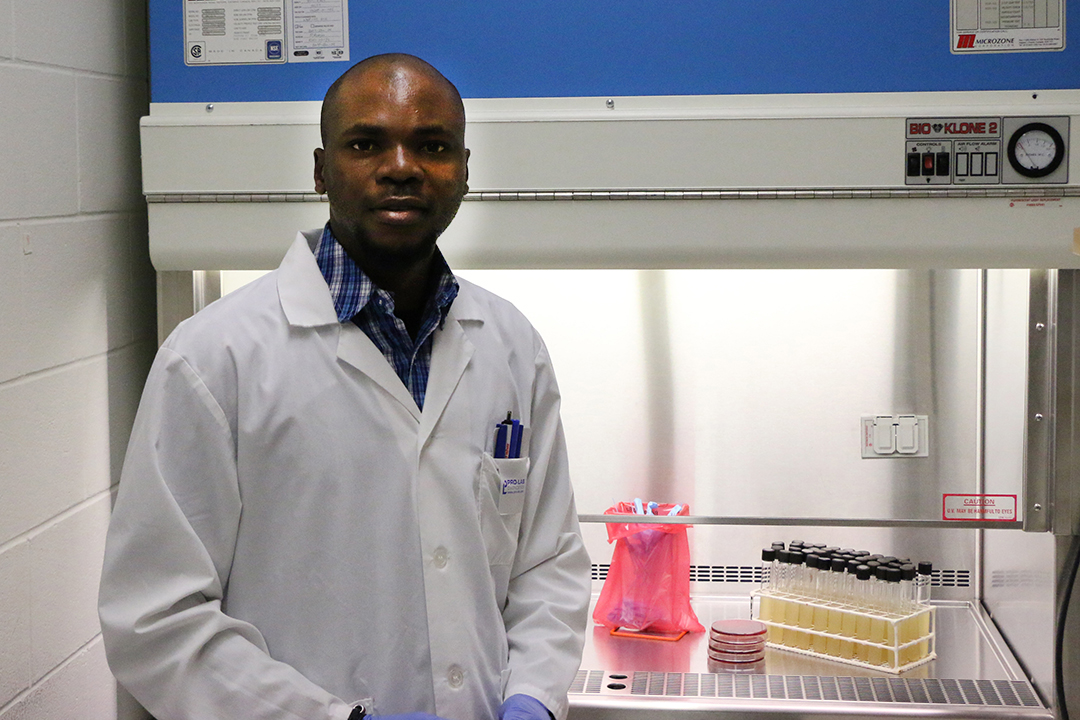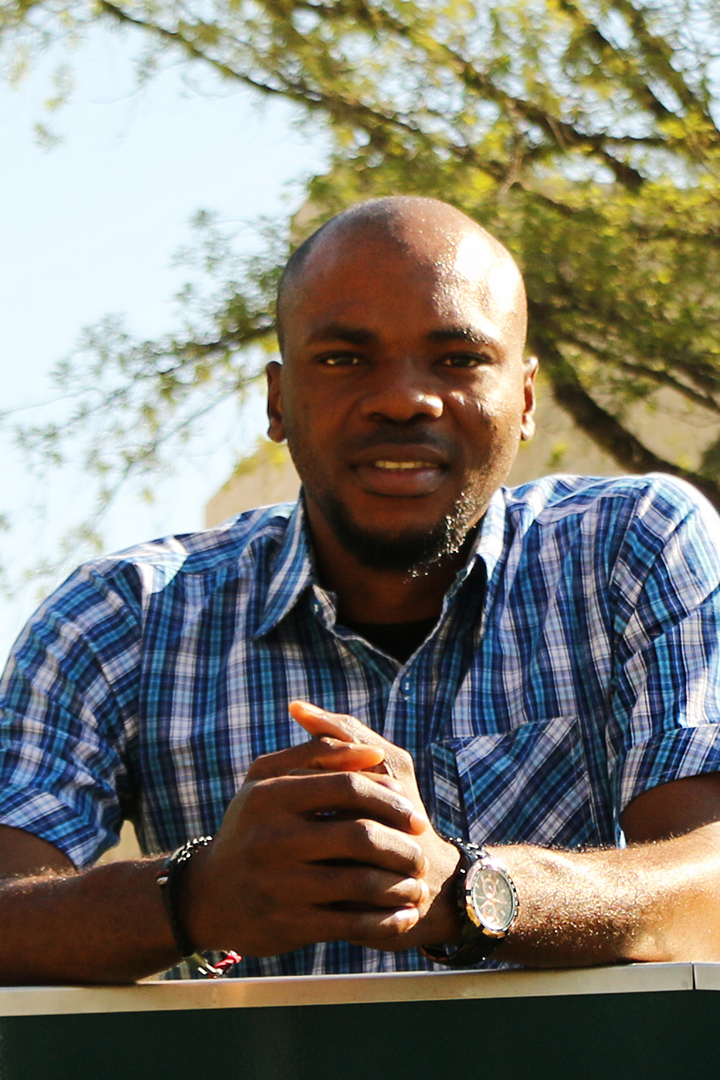
Little things in life make researcher’s day
Microbiologist Moses Ikechukwu’s enthusiasm for his research work is infectious — spending even 20 minutes with him can put anyone in a good mood. His passion for learning was passed down to him from his parents who sacrificed a great deal for their son’s education in Nigeria.
By Harrison Brooks
Ikechukwu describes his younger self as “curious and inquisitive, always trying to understand the nature of the world itself.” He always knew he wanted to be a scientist, but it wasn’t until he picked up a microbiology textbook in high school that his dream of becoming “a great research microbiologist” began. As he turned the pages, Ikechukwu was amazed to read about tiny organisms, too small to see, that have been responsible for millions of deaths.
That moment, which happened about 17 years ago, started Ikechukwu down the path that would one day take him over 10,000 kilometres from Nigeria to the University of Saskatchewan where he’s a visiting researcher at the Western College of Veterinary Medicine (WCVM).
Ikechukwu speaks with a fiery intensity when asked about the state of education in his country. He has witnessed the problems — a lack of infrastructure, classroom over-crowding and under-funding — as a student in southern Nigeria, and more recently, as a teacher in the country’s north during his one year with the national youth service corps. Only seven per cent of Nigeria’s national budget is directed toward education – 19 per cent less than the United Nations’ recommendation for developing countries.
Ikechukwu describes a corrupt system that allows only the nation’s political class and other elites to gain a quality education. “One way to crumble a country is to let education go bad,” he says.
His father is a civil servant at Obafemi Awolowo University — the same school where Ikechukwu received his undergraduate and master’s degrees. His mother is a businesswoman who has sold a variety of items including cosmetics and soft drinks. His parents’ stable jobs allowed Ikechukwu to attend school in the ancient city of Ile-Ife, located in the rich Osun State, southwest Nigeria.
While Ikechukwu has never been in a position quite as dire as what he has witnessed throughout the different regions of Nigeria, he recalls his family skipping meals countless times or eating once a day for extended periods so his parents could afford tuition.
“I knew it was tough, but there was no time I ever thought I wasn’t going to continue,” says Ikechukwu.
After receiving his master’s degree, Ikechukwu moved to southeast Nigeria and began lecturing at Ebonyi State University. He’s also working on his PhD program at Nnamdi Azikiwe University in Awka, Nigeria.
Urged by his supervisor to focus his research on the bacterium Staphylococcus pseudintermedius, Ikechukwu began searching the internet for previous studies. He started with a search of Nigeria, then West Africa, and finally, all of Africa. None of his searches came back with any real results until he searched the entire world.
“The first thing that popped up was [the name] Joe Rubin, so when I started to look at what has been done on S. pseudintermedius, I saw that most of his work has been referenced by almost all of those [studies],” says Ikechukwu, whose interest was piqued. “Who is this? Who is this Joe?"
Ikechukwu tracked down every piece of online information he could find on Rubin, but he was still having trouble contacting the Saskatchewan researcher. Eventually, Ikechukwu got in touch with one of Rubin’s former graduate students who made the connection. Ikechukwu then sent an email to Rubin, stating his desire to come to the WCVM.
“As faculty, I receive a lot of emails like that — I have probably a dozen a week,” says Rubin, an assistant professor in the WCVM’s Department of Veterinary Microbiology. “What really stood out for me about Moses' email is he really had a plan. He said, ‘I want to come to Saskatoon, this is what I want to do, [and] these are the techniques I want to learn.’ And it was just so obvious that [the email] wasn’t generic.
“What Moses has brought to [our] team is an amazing attitude, a really excited willingness to learn and just an enthusiasm for doing his experiments.”
Since his arrival in March Ikechukwu has been working closely with Rubin and studying S. pseudintermedius. This bacterium is commonly found on the skin or in the mouth, nose or intestinal tract of up to 90 per cent of healthy dogs and a smaller percentage of healthy cats. It’s described as an opportunistic pathogen because it can only cause infections in animals and people if their immune systems have been compromised. Of the 102 S. pseudintermedius isolates (samples) that Ikechukwu brought from his home country, tests have shown the Nigerian bacteria to be generally more resistant to antibiotic drugs than the same bacteria from Western Canada.
What really excites Rubin about Ikechukwu’s work is the chance to look at the human connection with S. pseudintermedius – an area that hasn’t been exclusively studied yet. Among his samples, Ikechukwu came with 13 isolates taken from people and their dogs. Using DNA fingerprinting techniques, the researchers will determine whether those corresponding bacteria are matches. If they are, Rubin says that information would help his team understand how commonly dogs transfer S. pseudintermedius to people.
For the first time in his professional career, Ikechukwu has access to all the research resources he could ever need: electricity that never dies, Wi-Fi that’s free and extremely fast, and equipment that he never dreamed of using in Nigeria.
“I left for home that day at, like, 10 p.m.,” he says, recalling his first day in Rubin’s lab at the WCVM.
“This is what I wanted — I wanted an environment where I can work. I believe that I'm going to learn a lot. And when I go back to my country, I'm not going to be the same, I’m going to be very, very different.”
When Ikechukwu finishes his research in August, he plans to return home to Nigeria, finish his PhD degree and then search for postdoctoral research opportunities.
He may be going home a different person in terms of experience and knowledge, but one thing that will never change is his undying passion for learning and his enthusiastic outlook at life. His parents made sure of that.
Harrison Brooks of Fort Qu’Appelle, Sask., is a third-year student at the University of Regina’s School of Journalism. Harrison is the summer research communications intern at the WCVM.